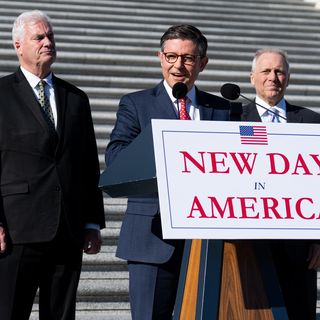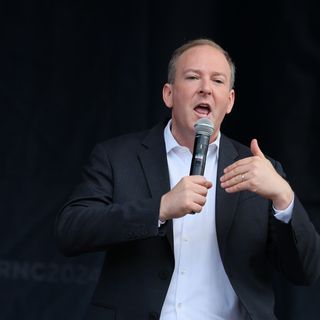Reading view
Trump meets with Saudi defense minister at the White House and discusses Iran situation
President Trump met with the Saudi Defense Minister Prince Khalid bin Salman at the White House on Thursday and discussed the situation with Iran and other regional issues, according to a source familiar with the meeting.
Why it matters: Saudi Arabia wants to de-escalate tension in the region after the 12-day war between Israel and Iran.
- The talks took place ahead of Israeli Prime Minister Benjamin Netanyahu's Monday meeting with Trump at the White House.
- The Trump administration wants to push for a historic peace deal between Saudi Arabia and Israel in the coming months.
What they're saying: After his meeting with Trump, the Saudi foreign minister spoke on the phone with Chief of Iran's General Staff of the Armed Forces, Maj. Gen. Abdolrahim Mousavi.
- "We discussed developments in the region and the efforts being made to maintain security and stability," wrote Bin Salman, who is a younger brother of Saudi Crown Prince Mohammed bin Salman.
- The meeting between Trump and the Saudi defense minister was first reported by Fox News.
- The White House didn't immediately respond to Axios' request for comment on Thursday evening.
Driving the news: White House envoy Steve Witkoff is planning to meet with Iranian Foreign Minister Abbas Araghchi in Oslo next week to restart nuclear talks, Axios reported on Thursday.
- Araghchi spoke with on the phone on Thursday with Norwegian Foreign Minister Espen Eide and discussed the efforts to deescalate tensions in the region, the Iranian Foreign Ministry said.
- Trump told reporters on Thursday that Iran wants to speak with the U.S. and "it is time that they do."
- The president said the U.S. doesn't want to hurt Iran. "I know they want to meet and if it is necessary I will do it," he said.


Companies in a handful of states take the biggest brunt of Trump's tariffs
Tariffs imposed by President Trump have generated tens of billions of dollars in revenue for the government — but the burden falls far from equally on different states.
The big picture: Who pays for tariffs is a long-settled issue — American businesses do, to the tune of billions of dollars, in places like California and Texas especially.
Driving the news: Economic research firm Trade Partnership Worldwide shared a new analysis with Axios showing the state-by-state cost of tariffs imposed by Trump from January through May.
- These are presidential tariffs — that is, tariffs imposed by Trump rather than Congress, mostly this term but some dating to his first term.
By the numbers: From January 1 to May 31 of this year, California faced a tariff impact of $11.3 billion, by far the highest in the country.
- Texas was a distant second at $6 billion, followed by Michigan at $3.3 billion.
- In total, in 17 states companies faced a total impact of at least $1 billion over the first five months of the year.
- At the other end, 11 states had a burden of less than $100 million, with the smallest hits to Wyoming and Alaska at just over $16 million each.
The intrigue: The burden crosses political boundaries, too — more than half of the most-impacted states voted for Trump in the last election.
The bottom line: Recent deals, like one with Vietnam, prove tariffs aren't going away anytime soon.


Scoop: Congressional Republicans go on offense on Trump's "big, beautiful bill"
House Republicans' campaign arm is going on the offensive in the battle for public opinion over President Trump's "big, beautiful bill."
Why it matters: Democrats have hammered Republicans over the legislation's deep cuts to Medicaid, but the National Republican Congressional Committee thinks they have the winning message to expand their numbers in the 2026 midterms.
- Republicans plan to message their legislative victory by branding Democrats' opposition as voting to raise taxes on small businesses and American families, according to an internal memo first shared with Axios.
- "Every Democrat voted to hurt working families and to protect the status quo. ... House Republicans will be relentless in making this vote the defining issue of 2026," the memo says.
Yes, but: Republicans have their work cut out for them.
- Recent polls have shown that only 23%–38% of American adults and voters support the legislation.
Zoom in: The House-passed bill makes permanent Trump's 2017 tax cuts and adds additional tax benefits — no tax on tips or overtime and a temporary tax deduction for those 65 and older.
- The NRCC is highlighting a $1,700 tax cut for families of four in their messaging efforts.
- Trump is set to speak Thursday evening at the Iowa State Fairgrounds — an event that's part July 4 celebration and part "big, beautiful bill" victory lap.
State of play: The House narrowly passed the bill 218-214, and GOP members with an array of concerns have spent days publicly dunking on the measure.
- Rep. Keith Self (R-Texas) called the bill "morally and fiscally bankrupt" in a post on X.
- Rep. David Valadao (R-Calif.) said the bill makes "harmful cuts to Medicaid" and puts "critical funding at risk."
- Both ultimately voted in favor of the bill with no changes.
The other side: Democrats are already vowing to make the bill a centerpiece of their midterm strategy, too.
- "From now until November 2026, the DCCC will continue to communicate the harm this bill will cause," a memo from the House Democrats' campaign arm says. "Republicans will lose the majority in 2026 and the Big, Ugly Bill will be the reason why."
Zoom in: The NRCC is confident that work requirements in Medicaid and increased border security funding resonate with voters, and they plan to spotlight those provisions.
- The memo cites an internal GOP poll that found 72% of voters support work requirements, and 86% support removing deceased or ineligible recipients from Medicaid.
The bottom line: Republicans still have a highly skeptical public to convince.
- Republicans are aware polling as a whole isn't pretty, Axios' Stef Kight reports, but Senate Majority Leader John Thune (R-S.D.) predicted last week that those numbers would improve after the final bill is passed.
Editor's note: This story is corrected to state that the bill will give a temporary tax deduction for those 65 and older (not eliminate a tax on Social Security).


Trump Administration Sending Hundreds of Marines to Florida to Help ICE
Trump says he made no progress on Ukraine in his call with Putin
President Trump said on Thursday he made no progress in his call with Russian President Vladimir Putin regarding the war in Ukraine.
Why it matters: The call took place amid a stalemate in Trump's efforts to end the war between Russia and Ukraine and two days after the U.S. paused weapons shipments to the Ukrainian Army.
- Putin's foreign policy adviser Yuri Ushakov said the issue of U.S. weapons supply to Ukraine didn't come up during the call between Putin and Trump.
- Trump told reporters on Thursday before boarding Air Force One on his way to Iowa that the U.S. hasn't paused weapons supply to Ukraine, but "we have to make sure we have enough for ourselves."
Driving the news: Trump said he had a long call with Putin on Iran and Ukraine. According to the Kremlin, the call lasted more than an hour.
- Trump said he "is not happy" about the war in Ukraine and stressed he "didn't make any progress at all" on this issue in his call with Putin.
The other side: Ushakov told reporters that Putin and Trump had a "detailed discussion" about Iran and the situation in the Middle East.
- He added that Putin stressed that the Iranian issue must be settled only through diplomacy.
- Ushakov said Trump stressed during the call that he wants to end the war between Russia and Ukraine swiftly.
- Putin told Trump that Russia is not going to give up on its goals in Ukraine, Ushakov said, adding that Russia sees its peace talks with Ukraine as a bilateral issue that the U.S. shouldn't be actively involved in.
What's next: Ukrainian officials said President Volodymyr Zelensky is scheduled to speak with Trump on Friday to discuss the pause of the weapons shipments.
Editor's note: This story has been updated with additional details about the phone call.


EPA places 139 on leave over letter bashing Trump policies
The EPA said Thursday it has placed 139 employees on leave after they signed a "declaration of dissent" accusing the agency of "unraveling" health and environmental protections for political reasons.
Why it matters: The letter and EPA pushback escalates internal and public disputes over the agency's deregulatory moves under President Trump.
Driving the news: "The Environmental Protection Agency has a zero-tolerance policy for career bureaucrats unlawfully undermining, sabotaging, and undercutting the administration's agenda as voted for by the great people of this country last November," an EPA spokesperson said.
- The agency said the employees are on leave pending investigation, noting that they used official titles and EPA positions. EPA also said the letter to Administrator Lee Zeldin contained misleading information.
Catch up quick: The communication from current and former EPA employees — organized in conjunction with the nonprofit "Stand Up for Science" — cites a "culture of fear" at the agency.
- It accuses EPA under Zeldin of "misinformation and overtly partisan rhetoric," citing examples like his criticisms of Biden-era grants as a "green slush fund" and praise of "beautiful, clean coal."
- It also says EPA is taking many actions that "contradict EPA's own scientific assessments" in areas like mercury and greenhouse gas emissions.
- Another section criticizes the unwinding of programs on "environmental justice" — efforts to address higher environmental burdens that poor people and communities of color often face.
The latest: As of Thursday afternoon, 620 people had signed the letter, per the group's website. Roughly 500 are current EPA employees, including both named and anonymous signers, Stand Up for Science founder and executive director Colette Delawalla told Axios.
- The group has now taken the names off the public-facing version of the letter, which she said was first sent internally to Zeldin on Monday morning and made public shortly afterward.
- She criticized the decision to place workers on leave.
- "In America, employees cannot email their bosses about concerns in their place of employment now. It's astounding," she said.
The other side: Zeldin and other Trump officials say Biden administration policies placed undue burdens on domestic energy producers and strayed from EPA's core functions.
- The administrator has talked up EPA's role in pursuing Trump's "energy dominance" agenda.
- EPA's proposals to vastly cut spending are part of a "back-to-basics" approach to environmental protection, the agency said in budget documents.
What we're watching: The NYT reports that Justin Chen, an official with the American Federation of Government Employees Council 238 that represents many EPA workers, said EPA's move was an "act of retaliation."
- He said the union would "protect our members to the full extent of the law."


Zohran Mamdani's Chances of Beating Cuomo, Adams in NYC Race: Poll
Brandon Graham Issues Critical Advice to Eagles After Super Bowl
How to Watch Phoenix Mercury vs Dallas Wings: Live Stream WNBA, TV Channel
How to Watch Washington Mystics vs Minnesota Lynx: Live Stream WNBA, TV Channel
Cardinals Predicted To Cut Ties With $81 Million Star In Huge Trade
Madre Fire explodes in size to become California's biggest this year
A wildfire in California's San Luis Obispo County exploded in size Thursday, triggering evacuation orders and sending smoke plumes southeast into Santa Barbara and Ventura counties.
The big picture: The massive Madre Fire has surpassed January's destructive Los Angeles-area fires to become California's largest this year, as much of the state faces hot, dry conditions that raise the wildfire risk ahead of the Fourth of July holiday.
The Madre Fire erupted in size in California yesterday and last night, becoming the state's largest wildfire so far this year.
— CIRA (@CIRA_CSU) July 3, 2025
The fire has grown to 35,530 acres and is 5% contained. pic.twitter.com/AmzRhhJ7yo
- Officials warn that the smoke impacts of the blaze that's one of several wildfires burning in the state will be "far-reaching."
By the numbers: The Madre Fire ignited near State Route 166 on Wednesday and had grown to 35,530 acres by Thursday lunchtime local time, per Cal Fire.
- The blaze had swelled to 52,593 acres and remained at 5% containment by 4pm.
Threat level: Part of the highway was closed due to the blaze, per a San Luis Obispo County Office of Emergency Services Facebook post.
- Evacuation orders and warnings were in effect for communities in San Luis Obispo and Santa Barbara counties near the highway as the blaze burned toward Carrizo Plain National Monument, a region some 125 miles northwest of LA that's known for its grasslands and spring wildflowers.
Between the lines: Research shows hot, dry and windy weather that helps wildfires spread is becoming more common across much of the U.S. amid climate change, per Axios' Alex Fitzpatrick.
Go deeper: Newsom says Trump "caved" after 150 California National Guard troops moved to wildfire duty
Editor's note: This is a breaking news story. Please check back for updates.


My husband and I stuck to traditional vows on our wedding day. 3 years later, I still regret that decision.
Courtesy of Ashley Archambault.
- My husband and I opted for a small, intimate wedding in 2022.
- I had always wanted to write my own vows, but family advised against it and I didn't push the issue.
- Three years later, I still wish I had stood up for what I wanted.
My husband and I said our "I dos" during the pandemic. For us, it was a great excuse to keep the event on the smaller side, though our families wanted us to invite every extended family member. We would have wanted our wedding to be intimate, regardless of the safety concerns at the time.
My husband proposed in July 2021, and we were married six months later. As the planning process progressed, I found that we were making more and more concessions — mostly to our families — instead of sticking to what we wanted for our big day. Looking back, I wish I had stuck to my guns on some of them.
I wasn't a picky bride, but there were certain things I had envisioned.
I didn't have a strict blueprint for my wedding. I had a handful of things I wanted, such as my son walking me down the aisle since I was a single mom when I met my husband. But most of all I wanted the wedding to be as much my husband's as it was mine. Basically, I wanted everything to be agreed upon by both of us.
It seemed the more relaxed we were about the wedding, the more our respective parents worried about some other aspect we hadn't even thought of. But it wasn't just our family. Nearly everyone that learned we were getting married asked if we had done this or that "yet." We just wanted to have a simple party with our closest friends and family, but everyone we talked to pointed something else out that we had been blissfully unaware of.
I wanted my soon-to-be husband to be happy, so I compromised
I had always wanted to write my own vows, but as the wedding loomed closer, my husband seemed stressed out about writing his. His father, who was a minister and was going to be the one to marry us, wanted us to stick to the usual script. I was tired of battling everyone's expectations and wanted to ease my soon-to-be husband's stress, so I gave in and simply said, "fine."
My husband seemed relieved, and at the end of the day, I thought what really mattered was that we would be married. Looking back, I can see how stressed out I was during the planning process all the way through our wedding, which was far more stressful than I had thought it would be. I know now that my judgement was clouded.
My heart was in the right place, but it wasn't the right choice
There were a lot of things I didn't love about how our wedding played out, but my biggest regret is not committing to writing our own vows. I've even asked my husband if he'd consider remarrying just to recite vows that we've each written, but the moment has come and gone.
Part of why my husband was having trouble with his vows was because they would be said in front of everyone we knew, not just the two of us. But if I could go back in time, I would have talked it out with him.
Mostly, I know my husband would have stuck to our vows if I had let him know how important it was to me. Compromising is an important part of a relationship, but for our marriage to be successful, I think it's important that neither of us are making too many concessions, especially when it's something that really matters.
I use my wedding regret to make my marriage stronger
I worried so much about everyone else, including my husband, that I let go of one of the few things that mattered to me. I think worrying more about everyone else, in different ways, was a mistake we both made.
Courtesy of Ashley Archambault.
The upside is that we can learn from worrying overly about everyone else but ourselves and work at taking care of each other within our marriage.
I catch myself thinking about what I would have said at the altar so much that it's become a fantasy. It's usually when I realize how much I love him or how lucky I feel to be with him. While I can't go back in time, I can write and share my fantasy vows with my husband for the rest of our lives. When I think of it that way, it's a lot more romantic than just telling him once on our big day.